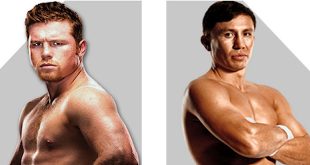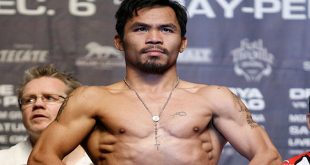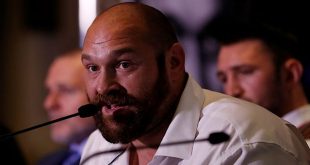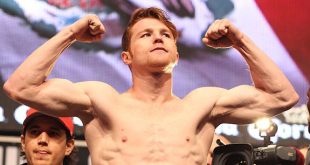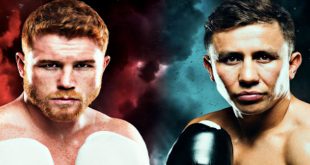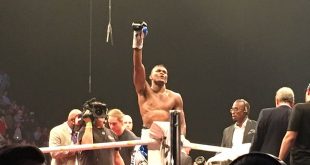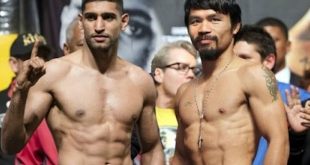For a fight that only happened because Roy Jones Jr. is irrelevant in the light heavyweight division, it did at least give us a legitimate light heavyweight champion. Many see Antonio Tarver’s impeccable record in rematches as a redeeming feature. I cannot help but wonder why he does not get the job done in the first place, especially for a thirty-six-year-old fighter without the luxury of time with which to enhance his reputation. That is precisely what Tarver must do now that he stands atop the light heavyweight division once again. Glen Johnson’s excursion into genuine championship quality might have been fleeting, but if it adds an extra zero to the end of the figure he earns from wherever he now plies his trade, it was a worthwhile one. The expectation now rests on Tarver, and given that the first names of a potential hit list out of his mouth were Bernard Hopkins and Roy Jones, we are not off to an optimistic start.
Not long removed from bankruptcy declaration, Tarver’s eye will likely fix on a target with whom he can make retirement money. Johnson’s defeats of Jones and Tarver himself mean that in terms of overall credibility, Tarver has work to do. The problem is that with Jones finished and Bernard Hopkins two weight classes south, and no certainty to overcome Jermain Taylor next month, viable options for Tarver are difficult to see. Clinton Woods is the IBF champion, and deservedly so having fought enough final eliminators to secure him title shots until doomsday. Woods is game, but likely to be out of his depth with Tarver. That leaves Frenchman Fabrice Tiozzo, the well-worn, former cruiserweight and current WBA light heavyweight champion. Tiozzo recently retired Dariusz Michalczewski, but also holds the dubious distinction of a career knockout loss in a round by an aged Virgil Hill. Still, Tiozzo might prove a more plausible opponent in terms of quality and recognition as opposed to WBC champion Tomasz Adamek who remained undefeated after fighting Paul Briggs, but also unknown to boxing fans at large.
Selling points for the aforementioned fights are hard to find, as at one point or another, Tarver has already held each of the light heavyweight crowns. Unification fights would draw the other champions into the light, but as the universally recognized champion, they would be fruitless exercises for Tarver. In the coming months, we shall discover exactly what kind of champion Tarver intends to be. If his intentions do indeed centre on amassing a retirement fund as quickly as possible, the nature of his choices will suit that goal, but if a boxing legacy, personal challenges and the respect of the industry emerge as his priorities, I feel there is but one path for him to take.
Tarver’s knockout of Jones produced a hysteria, of which predictably enough he himself was a chief instigator. One assertion emanating from his camp was that he might try his hand at the heavyweight division. While competing with natural heavyweights appears possible in the natural promotional machine that is Tarver’s brain, in reality, it is a bridge too far. What is conceivable is that with the light heavyweight division wrapped up, Tarver does have the physical capacity to compete as a cruiserweight. The angle of the all-conquering light heavyweight champion seeking out by putting himself at a slight disadvantage is a great selling point, and one that could endear Tarver to those who feel he lacks humility. The cruiserweight division’s long search for someone to elevate it from the dungeon of world boxing recognition might find its hero in the charismatic Tarver who can talk and punch with equal venom.
Unified WBC/WBA cruiserweight champion Jean Marc Mormeck would provide a fitting stylistic contrast to Tarver and the Frenchman appears to be sitting idle on his derailment of Wayne “Big Truck” Braithwaite, the hard-hitting Guyanese fighter who might be one big fight away from redemption. O’Neil “Super Nova” Bell got hell for his controversial decision win over Canada’s Dale Brown. If Bell feels he has something to prove, a showdown with Tarver would be a good way to begin. British cruiserweight prospects Enzo Maccarinelli and David Haye are two more exciting additions that may not figure in Tarver’s immediate future, but they nonetheless add weight to the opinion that the cruiserweight division is primed for a resurgence of sorts.
Time will tell exactly how Tarver intends to conduct the rest of his career. With a distinct lack of time at his disposal and even less appealing opportunities in his immediate vicinity, it is obvious that if a legacy built on achievement and respectability is his aim, it is one he will have to take bold steps to achieve.
Jim Cawkwell can be reached at jimcawkwell@yahoo.co.uk
 Boxing News Boxing News
Boxing News Boxing News
